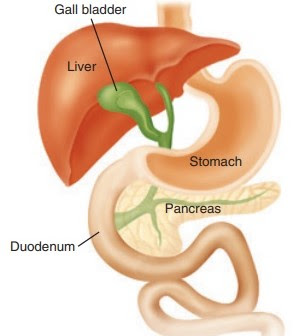The liver is an organ only found in vertebrates which detoxifies various metabolites, synthesizes proteins, and produces biochemicals necessary for digestion and growth.
In general, main functions of the liver in digestive system include:
*Bile production and excretion
*Synthesis of plasma proteins
*Production of cholesterol and special proteins to help carry fats through the body
*Storage of glycogen, vitamins, and minerals
Liver main job within the digestive system is to process the nutrients absorbed from the small intestine.
Liver is important in carbohydrate metabolism where hepatic cells conduct glycogenesis (converting glucose into glycogen) , and glycogenolysis (breaking glycogen down to glucose).
The liver is one of the largest organs in the body and it is continuously producing bile. Bile from the liver secreted into the small intestine plays an important role in digesting fat and some vitamins.
Bile flows out of the liver into the right and left hepatic ducts, into the common hepatic ducts, and toward the small intestine to help with digestion and the absorption of fats.
Functions of liver in digestive system
What does the term "diet" mean? The definition of a diet as the complete oral consumption of nutrients and non-nutritive substances is comprehensive yet lacks specificity. It is defined by the typical composition and allocation of nutrients and foods ingested by an individual or a specified group.
Friday, January 21, 2022
The most popular Articles
-
Low-calorie fruit drinks and ades: Includes low-calorie and low-sugar fruit drinks, punches, and ades. Total carbonated soft drinks: Include...
-
Herbs are the leaves of temperate climate plants; temperate climates have summers and winters of similar length. Examples are parsley, chive...
-
A number of minerals or elements are required for normal body functions. Certain mineral matters are indispensable to the growth of the body...
-
Vitamin C, known as ascorbic acid, holds a pivotal role as a vital nutrient for both human and animal well-being. This vitamin is instrument...
-
Cultivated guava is Psidium guajava belonging to family Myrtaceae. Fresh guavas are rich in vitamins A, B and C. The fruit has its highest c...
Other interesting articles
-
The Evolution of Modern Food Flavor - The evolution of modern food flavor is a story shaped by scientific curiosity, technological progress, and the growing demands of an industrialized world. ...






